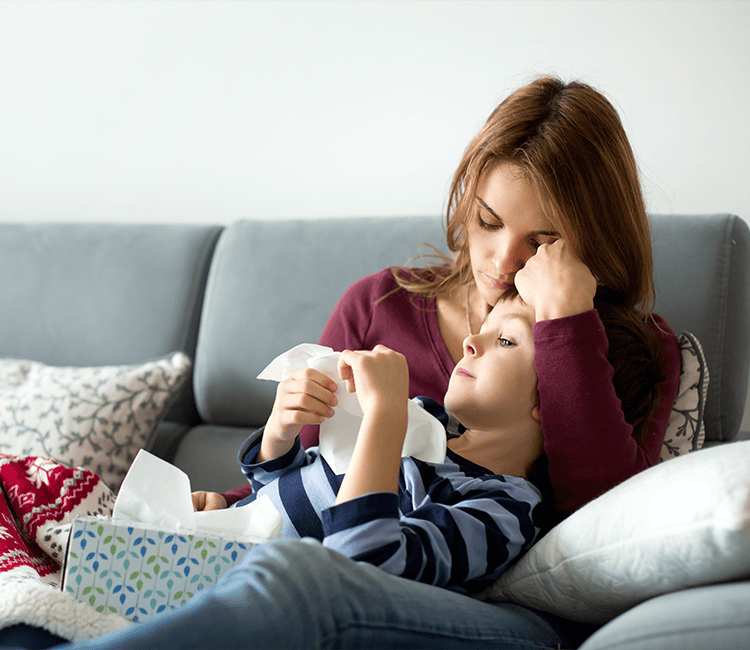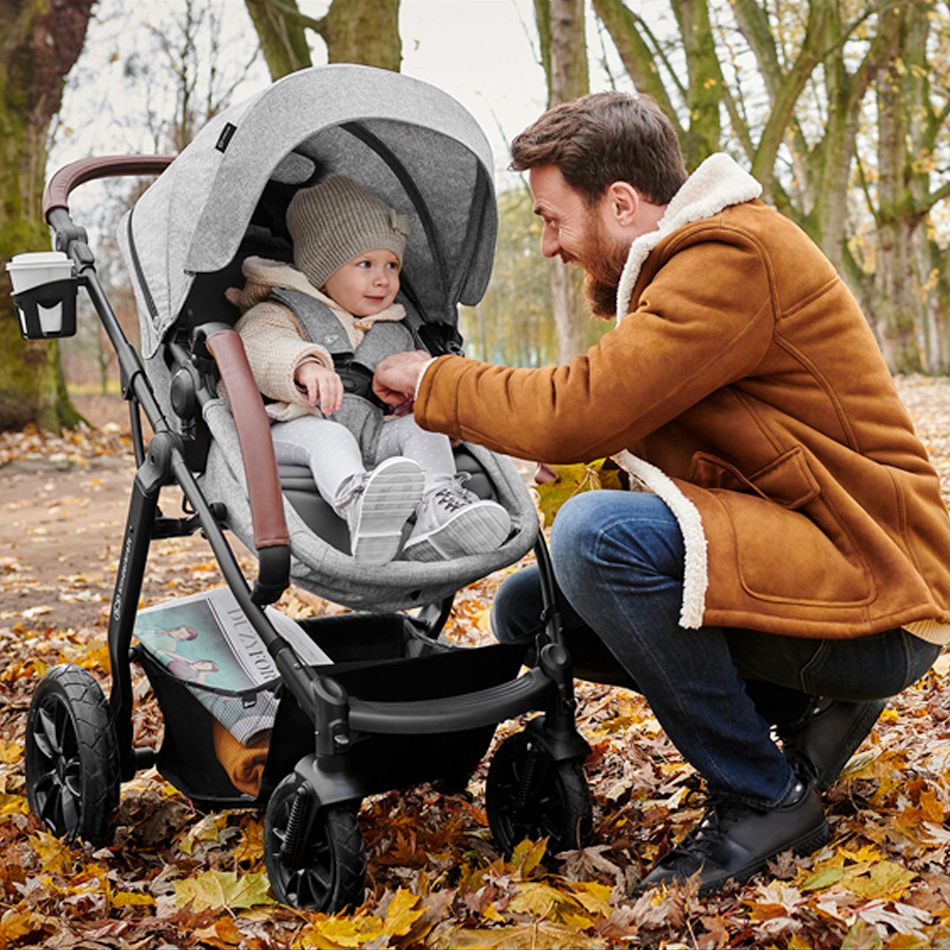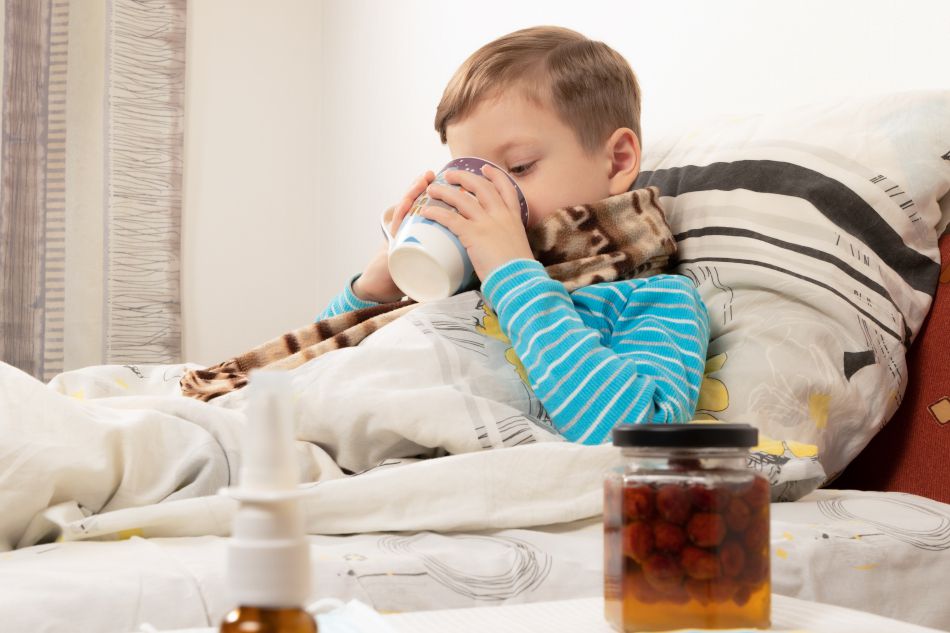How to improve your child's immunity

Autumn is just around the corner, and so are cooler days. Children love autumn, but let's be honest – it's much easier to get a cold during this period. Temperature fluctuations and cool winds are conducive to infections. What can you do to prevent your little one from getting sick very often? How can you improve their immunity?
Always consult supplementation and medication with a doctor
Remember that you should implement these tips throughout the entire year. Giving vitamin C or drinking orange juice as a one-off won't strengthen your youngster's immunity, so it's very important to be regular.
In addition, you should always consult medications and supplements with a doctor. Vitamin D is recommended for everyone, but the dose and frequency of use must be set by a professional! Giving additional vitamins or supplements without consulting a paediatrician and performing the necessary check-ups is dangerous for children. Before the visit, it's good to perform a basic blood test and a more in-depth one to check the level of microelements in your little one's body (e.g. the level of vitamin D3), so your doctor can act quicker. However, there are ways of supporting immunity that we'll recommend in this article that you don't have to consult with a doctor. You probably already use some of them without even knowing it. Let's take a look!

Home methods to increase your child's immunity
Boosting a youngster's immunity can be challenging, and so you should be taking such steps throughout the entire year. But don't worry, we're not talking about drinking cod liver oil or eating spinach every day. We know you likely already use most of these tips :)
Vitamin C is your friend
Many of you probably remember sour vitamin C tablets. But who would want to take them more often than necessary? Luckily, there are many other, tastier methods to get vitamin C in your child. In short, we can say that to give your youngster vitamin C and look after their health, you just need to convince them to regularly eat a wide variety of vegetables and fruit :)
Vitamin C can be found in, among others:
- blackcurrant,
- parsley,
- red peppers,
- horseradish,
- Brussels sprouts,
- strawberries,
- wild strawberries,
- kiwi fruit,
- lemons,
- oranges,
Vitamin C strengthens the immune system, and taking it regularly decreases the likelihood of colds. Remember that vitamin C won't shorten the duration of an infection if your child is already unwell!
If your little one is a fussy eater, it's a good idea to make sure they're comfortable during meals. A comfortable high chair, such as SIENNA or ENOCK, is a must. It's not just about ensuring your youngster adopts the right posture while eating, but also about the width of the seat and height of the backrest. Ideally, the backrest should be profiled.
You should also check the tray – if there's no tray, your child may be discouraged from eating. This is mostly because at a certain age, kids want to be independent and are more willing to eat with their hands than being spoonfed. Simply choose a high chair that's easy to clean and give your little one a little bit of freedom.
Omega-3 fatty acids
Omega-3 fatty acids are very important for everyone. They have a positive impact on brain function and increase immunity. Omega-3 fatty acids are mainly found in fatty fish, and that's why there are easily absorbed cod liver oils available, particularly for fussy eaters. Obviously, most young children (and adults) won't want to drink cod liver oil every day.
Luckily, Omega-3s are also found in other ingredients, which are easy to include as part of the daily diet. These are:
- linseed oil,
- walnuts,
- fish (halibut, salmon, herring, cod, mackerel, sardines),
- broccoli,
- chia seeds.

Take lots of walks
One of the best ways of increasing immunity in children is taking daily walks. Try to spend at least an hour with your little one outdoors. Remember to not go overboard – if your baby has a runny nose, the weather is awful, or it's simply very cold, forget about a walk. But if it's autumn and there's no rain, you should try to take as many walks as possible, even if the temperature is low. Dress your child warmly – don't forget a scarf – and off you go to pick chestnuts or colourful leaves!
At first, your little one may not enjoy walks. Your youngster's legs may get tired, or they'll simply be bored. We've got solutions to these types of problems – balance bikes and tricycles. Choose a lightweight bike that you can either push if your little one is running or easily carry. And when your child gets tired, you can quickly convince them to rest actively ;)
Control the humidity in the room
The air in homes is very dry, particularly in autumn and winter. Closed windows, heaters running and low humidity outside mean that the nasal mucosa is dry and more prone to irritation. The same goes for your little one's throat. They may get a cough or nasal issues – irritation leads to susceptibility to colds when your youngster goes outdoors in cold conditions.
The optimal level of humidity in the room is 40 to 60%. It's good to buy a good-quality air humidifier – humid air also leads to better sleep, which is crucial for correct development.

React quickly to early signs of a cold!
Some parents don't react to early cold symptoms – it's no wonder, since not everyone can stay at home with their child when the little one simply has a runny nose. But there are other ways that'll allow you to easily deal with the first signs of an infection.
First and foremost is, of course, onion syrup. Onion contains bactericidal substances and minerals that strengthen the body (sulphur, silicon, and zinc). It's also full of vitamin C.
Golden milk, which is warm milk with honey and ginger, is also great for colds. You can also add some turmeric. All of these ingredients are soothing to a sore throat, while also being anti-bacterial.
Tea with raspberry juice or ginger, honey and lemon is also a very effective method. Don't forget, though, that classic teas contain taurine and caffeine, which are not recommended for children, particularly younger ones. Instead of standard tea, you can use natural fruit teas or, for example, rooibos tea.
A hot bath can also be helpful, particularly if your little one has is chilled to the bone (e.g. after playing in the cold). A warm bath will help your youngster relax and warm up their body. You can also add essential oils, e.g. eucalyptus or pine oil, to the bath if your child has the first signs of a blocked nose. Such a bath will additionally clear the airways.

Help your child at night
Night-time regeneration is key, so make sure your little one goes to sleep early and sleeps long enough. In addition, it's good to ensure that nothing disturbs your youngster in their sleep. This is difficult, but thanks to, for example, the option of adjusting the angle of incline of the mattress (available in the NESTE UP and UNO UP co-sleeper cots), it'll be easier for your child to breathe at night if they have a runny nose.
A blocked nose and night coughing often lead to sleepless nights. That's why you should try using essential oils or stick-on patches for the pyjamas with a scent that'll unblock your baby's airways. You can use syrups for coughs, but only after consulting with a doctor! Different syrups should be used at night and different ones during the day, and the same goes for a wet cough and a dry cough.
We hope that after implementing these recommendations, you'll quickly see a positive change in the coming season. Frequent infections are a huge problem not only for parents, but first and foremost for children. Remember to always treat the sickness until it's completely gone! Otherwise, your little one will be constantly sick, because their body won't be strong enough to regenerate.
